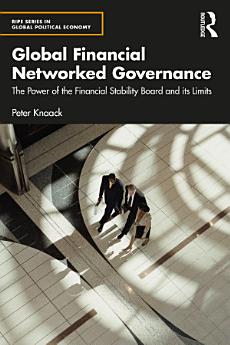Global Financial Networked Governance: The Power of the Financial Stability Board and its Limits
Peter Knaack
Dec 2022 · Taylor & Francis
Ebook
224
Pages
family_home
Eligible
info
reportRatings and reviews aren’t verified Learn More
About this ebook
Global Financial Networked Governance provides a careful analysis of the Financial Stability Board (FSB) and the standard-setters under its umbrella to show how such government networks harness the power of public reputation to herd their members into compliance.
The FSB’s track record in coordinating global financial regulatory reform is uneven. Some items on its agenda have seen the rapid evolution of globally coordinated regulatory standards and their implementation by all member states, sometimes even ahead of the stipulated timelines. In contrast, other initiatives have stalled at different stages of the policymaking process, global coordination is lacking, deadlines have been missed, and it is currently unclear when the post-crisis financial reform project will come to completion, if ever. In this book, the author asks the question: why has the FSB succeeded in some areas of its global financial regulatory coordination work and not in others? The book traces the global policymaking process in three major issue areas: banking regulation (Basel III), over-the-counter (OTC) derivatives, and ending too-big-to-fail. Through a combination of careful process tracing and rigorous testing against alternative explanations, it challenges the existing literature by revealing that the institutional pathway of policymaking is the main predictor of FSB progress. It shows that government networks on their own have succeeded in implementing globally coherent safety standards. In contrast, legislation and legislators in key G20 countries have limited the power and effectiveness of the FSB. The author analyzes the causes and effects of this phenomenon and suggests a novel institutional solution to the effectiveness-legitimacy dilemma that global governance forums face, combining the advantages of functional specialization and electoral accountability.
This book will be of great interest to graduate students; academics working at the intersection of economics, political science, and international law; students of the FSB in particular; and policymakers in global economic governance.
The FSB’s track record in coordinating global financial regulatory reform is uneven. Some items on its agenda have seen the rapid evolution of globally coordinated regulatory standards and their implementation by all member states, sometimes even ahead of the stipulated timelines. In contrast, other initiatives have stalled at different stages of the policymaking process, global coordination is lacking, deadlines have been missed, and it is currently unclear when the post-crisis financial reform project will come to completion, if ever. In this book, the author asks the question: why has the FSB succeeded in some areas of its global financial regulatory coordination work and not in others? The book traces the global policymaking process in three major issue areas: banking regulation (Basel III), over-the-counter (OTC) derivatives, and ending too-big-to-fail. Through a combination of careful process tracing and rigorous testing against alternative explanations, it challenges the existing literature by revealing that the institutional pathway of policymaking is the main predictor of FSB progress. It shows that government networks on their own have succeeded in implementing globally coherent safety standards. In contrast, legislation and legislators in key G20 countries have limited the power and effectiveness of the FSB. The author analyzes the causes and effects of this phenomenon and suggests a novel institutional solution to the effectiveness-legitimacy dilemma that global governance forums face, combining the advantages of functional specialization and electoral accountability.
This book will be of great interest to graduate students; academics working at the intersection of economics, political science, and international law; students of the FSB in particular; and policymakers in global economic governance.
About the author
Peter Knaack is an Adjunct Professorial Lecturer at the School of International Service at American University, in Washington, DC, USA. He also serves as a senior research fellow at the Global Economic Governance Programme at the University of Oxford, UK; as a research associate at the Centre for Sustainable Finance at SOAS University of London, UK; and an associate at the Council on Economic Policies, a Swiss think tank. His research focuses on global financial governance. He has written and published on the political economy of global financial standard-setting, digital financial inclusion, green finance, and China’s financial system.
Rate this ebook
Tell us what you think.
Reading information
Smartphones and tablets
Install the Google Play Books app for Android and iPad/iPhone. It syncs automatically with your account and allows you to read online or offline wherever you are.
Laptops and computers
You can listen to audiobooks purchased on Google Play using your computer's web browser.
eReaders and other devices
To read on e-ink devices like Kobo eReaders, you'll need to download a file and transfer it to your device. Follow the detailed Help Center instructions to transfer the files to supported eReaders.




